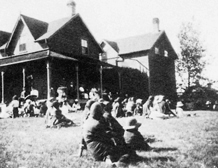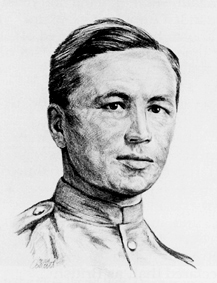The Sacrifices and Achievements

Indigenous people donated at least $44,000 for war relief, and formed many charity groups like the Red Cross Society, meeting at the Five Hills First Nations community at Belcarres, Saskatchewan, in 1915 (R.L. Borden / Library and Archives Canada / C-33257)
The First World War, with its trench warfare, poison gas and machine-guns, destroyed virtually a generation of young Canadian men. Among them were at least 300 Indigenous soldiers.50 Additional lives were lost to illness, particularly tuberculosis, which thrived in the damp trenches of Europe. Countless Indigenous Veterans returned to Canada with the beginnings of this often-fatal disease.
Over four years, Indigenous soldiers participated and earned medals for valour in practically every major land battle. They also supported the Allied cause at home, donating money and goods to the various relief and patriotic funds, and investing in victory bonds. By the time of the Armistice, donations from First Nations members to the various war relief funds totalled more than $44,000—a sizeable figure for the times. Indigenous women, like other Canadian women, were active in this area. They formed patriotic leagues, Red Cross societies and other charity groups, and they collected clothes, money and food for shipment overseas.
The wartime contributions of Indigenous people did not go unnoticed. For example, when the Prince of Wales visited the Brantford area in October 1919, he presented the Six Nations with a bronze tablet to commemorate the 88 of its members who were killed in, or as a result of, military action.51

Cameron Brant was one of the 88 Six Nations' war-dead whose names are recorded on a tablet donated to the Six Nations Reserve by the Prince of Wales. This portrait of Brant was sketched by Irma Coucill for the Indian Hall of Fame. (Woodland Cultural Centre)
And in Indian Affairs' 1918-1919 Annual Report, Duncan Scott wrote:
In this year of peace, the Indians of Canada may look with just pride upon the part played by them in the Great War both at home and on the field of battle. They have well and nobly upheld the loyal traditions of their gallant ancestors who rendered invaluable service to the British cause in 1776 and in 1812, and have added thereto a heritage of deathless honour which is an example and an inspiration for their descendants.52
Little did he know how soon their example and inspiration would be needed.
- Date modified: